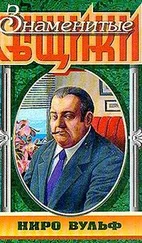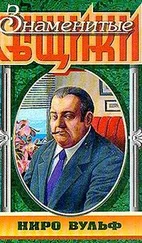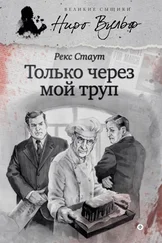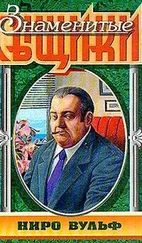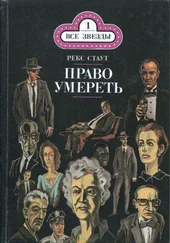Rex Stout
A Family Affair
When someone pushes the button at the front door of the old brownstone, bells ring in four places: in the kitchen, in the office, down in Fritz’s room, and up in my room. Who answers it depends on the circumstances. If it’s ten minutes to one at night and I’m out, no one does unless it won’t give up. If it keeps going, say for fifteen minutes, Fritz rolls out, comes up, opens the door the two inches the chain permits, and says nothing doing until morning. If I’m home I roll out, open a window and look down to see who it is, and deal with the problem.
It doesn’t often ring at that hour, but it did that Monday night — Tuesday morning — late in October. I was home, but not up in bed. I was in the office, having just got in from taking Lily Rowan home after a show and a snack at the Flamingo. I always look in at the office to see if Wolfe has written anything on the pad on my desk. That night he hadn’t, and I was crossing to the safe to check that it was locked when the bell rang, and I went to the hall and through the one-way glass of the front door saw Pierre Ducos on the stoop.
Pierre had often fed me. He had fed many people, in one of the three rooms upstairs at Rusterman’s restaurant. I had never seen him anywhere else — certainly never on that stoop in the middle of the night. I slipped the bolt back, opened the door, and said, “I’m not hungry, but come in.”
He crossed the sill and said, “I’ve got to see Mr. Wolfe.”
“At this hour?” I shut the door. “Not unless it’s life and death.”
“It is.”
“Even so.” I looked at him. I had never seen him without his uniform. I knew his age, fifty-two, but he looked older in a loose-fitting tan topcoat down to his knees. No hat. He looked as if inside of the topcoat he had shrunk, and his face looked smaller and seamier. “Whose life and death?”
“Mine.”
“You can tell me about it.” I turned. “Come along.”
He followed me to the office. When I offered to take his coat he said he would keep it on, which was sensible, since the heat had been off for two hours, and we had lowered the thermostat four degrees to save oil. I moved up one of the yellow chairs for him and sat at my desk and asked him what it was.
He gestured with both hands. “It’s what you said. Life and death. For me. A man is going to kill me.”
“That won’t do. Good waiters are scarce, and anyway you’re not old enough to die. Who is he, and why?”
“You make it a joke. Death is not a joke.”
“Sure it is. It’s life that’s not a joke. Who’s going to kill you?”
“I’ll tell Mr. Wolfe.”
“He’s in bed asleep. He sees people only by appointment, but for you he would make an exception. Come at eleven in the morning. Or if it’s urgent, tell me.”
“I—” He looked at me. Since he had seen me at close quarters at least fifty times, maybe a hundred, surely he had me sized up, so he may not have been considering me, but he was deciding something for at least ten seconds. He opened his mouth and shut it, then opened it again to speak. “You see, Mr. Goodwin, I know Mr. Wolfe is the greatest detective in the world. Felix says he is — not only Felix, everybody else. Of course you’re a good detective too, everybody knows that too, but when a man is sure he’s going to be killed unless he — unless...” His hands on his knees were fists, and he opened them, palms up. “I’ve just got to tell Mr. Wolfe.”
“Okay. Eleven o’clock tomorrow morning. What time do you go to work?”
“I won’t go tomorrow.” He looked at his watch. “Just ten hours. If I could — there on that couch? I won’t need covers or anything. I won’t disturb anything. I won’t make any noise.”
So he was really wide open, or thought he was. The couch, in the corner beyond my desk, was perfectly sleepable, as I knew from experience, having spent quite a few nights on it in emergencies, and on the other side of the projecting wall that made the corner was an equipped bathroom. But leaving anyone loose all night in the office, with the ten thousand items in the files and drawers, many of them with no locks, was of course out of the question. There were four alternatives: persuade him to tell me, go up and wake Wolfe, give him a bed, or bounce him. The first might take an hour, and I was tired and sleepy. The second was inadvisable. If I bounced him, and he couldn’t come at eleven in the morning because he was dead, the next time Wolfe lunched or dined in the little upstairs room at Rusterman’s he would be served by a new waiter, and that would be regrettable. Also, of course, I would be sorry.
I looked at him. Should I frisk him? Was there any chance that he had it in for Wolfe personally for some reason unknown to me, or that he had been hired by one of the thousand or so people who thought it would be a better world with no Nero Wolfe? Of course it was possible, but if so, this complicated stunt wasn’t the way to do it. It would have been much simpler and surer for Pierre just to put something in a sauce, in anything, the next time Wolfe went there for a meal. Anyway, not only had Pierre seen me at close quarters; I had seen him.
I said, “My pajamas would be too big for you.”
He shook his head. “I’ll keep my clothes on. Usually I sleep with nothing on.”
“All right, there’s plenty of cover on the bed in the South Room. It’s two flights up, on the same floor as my room, above Mr. Wolfe’s room. I was on my way up when you rang the doorbell.” I stood. “Come along.”
“But Mr. Goodwin, I don’t want — I can just stay here.” He stood up.
“No, you can’t. Either you go up or you go out.”
“I don’t want to go out. Sunday night a car tried to run over me. He tried to kill me. I’m afraid to go out.”
“Then follow me. Maybe when you sleep on it...”
I moved, crossed to the door, and he came. I flipped the light switch. I don’t dawdle going upstairs, and I had to wait for him at the top of the first flight because he was only halfway up. At the second landing I turned left, swung the door of the South Room open, and turned the light on. I didn’t have to check on the bed or towels in the bathroom because I knew everything was in order; all I had to do was turn the radiator on.
“I’m sorry, Mr. Goodwin,” he said. “I’m very sorry.”
“So am I,” I said. “I’m sorry you’re in a jam. Stick right here until I tell you I’ve told Mr. Wolfe about you. That will be around nine o’clock. If you open the door and go into the hall before eight o’clock, it will set off a gong in my room and you’ll see me coming with guns in both hands. Security. I should have offered you a shot of something. Whisky? Would it help you go to sleep?”
He said no and he was sorry, and I went, shutting the door. As I entered my room, down the hall, I looked at my watch. Seventeen minutes past one. I wouldn’t get my eight hours. When I get in that late I usually set my radio-alarm at nine-thirty, but now that wouldn’t do. I would have to be up and dressed and telling Wolfe about the company before he went up to the plant rooms at nine o’clock.
Of course I have figured how many minutes had passed after I entered my room when it happened. Six, possibly seven. I refuse to hurry the night routine. I had got my pajamas from the closet, set the alarm, put things from my pockets on the dresser, turned the bedcovers down, turned the telephone and other two switches on, hung up my jacket and necktie, taken my shoes and socks off, and was unbuckling my belt, when the earthquake came and the house shook. Including the floor I was standing on. I have since tried to decide what the sound was like and couldn’t. It wasn’t like thunder or any kind of gun or any other sound I had ever heard. It wasn’t a thud or a bang or a boom; it was just a loud noise. Of course there were doors and walls between it and me.
Читать дальше

